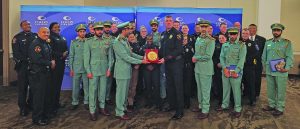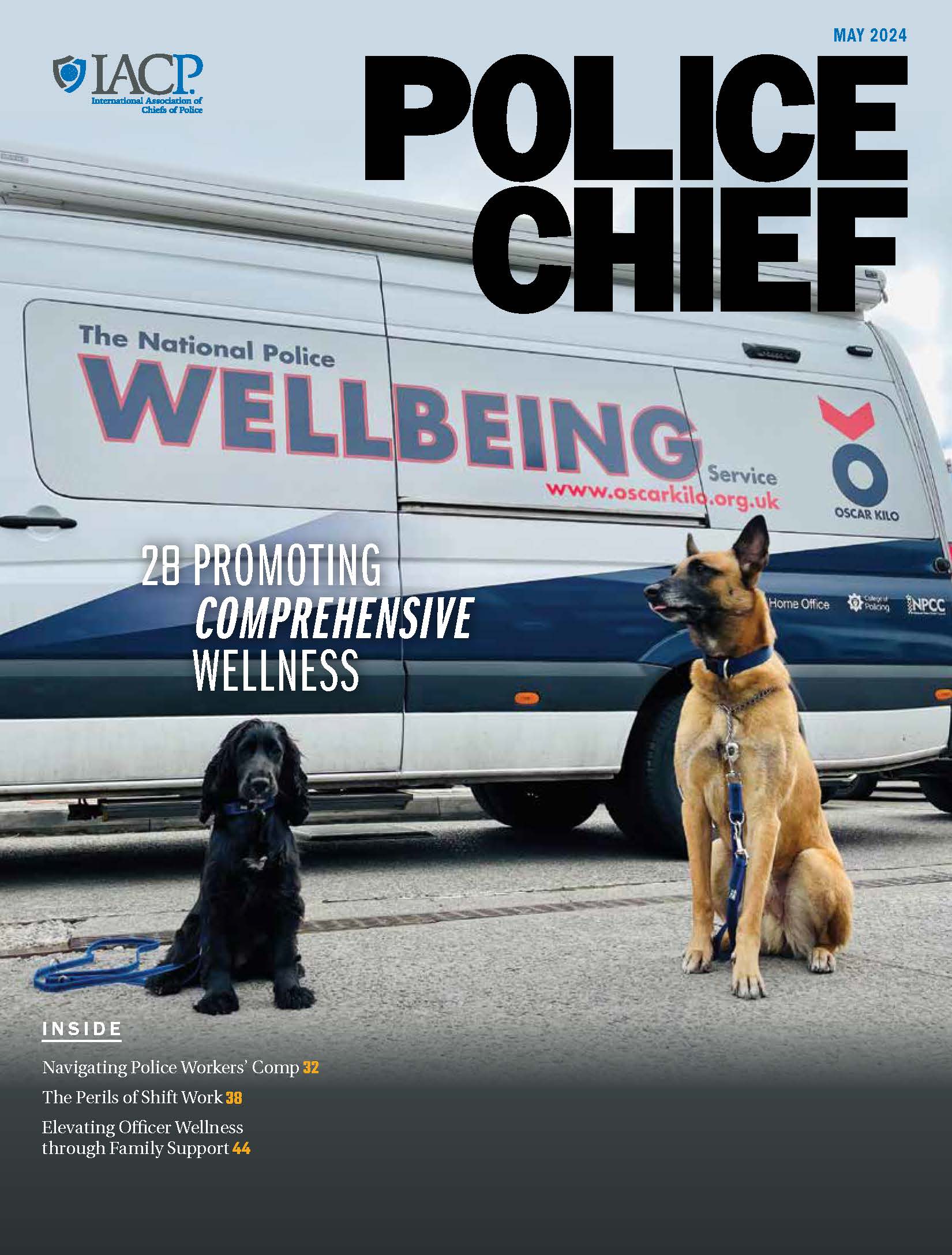The UAE Academy Exchange program was initiated in the spring of 2021 as a collaboration between the IACP; the United Arab Emirates Ministry of Interior (UAE MOI); the IACP’s World Regional Office in Abu Dhabi, UAE; and the Collin College Law Enforcement Academy (CCLEA) in McKinney, Texas.
Through the program, six officers from the UAE were enrolled in CCLEA’s 24-week, 855-hour basic police officer training program and graduated as part of CCLEA’s 111th Basic Peace Officer Course class.

Prior to their enrollment in the program, the six Emirati officers recently graduated from police colleges and police academies in Abu Dhabi and Dubai in the UAE. The six officers were selected for the exchange program due to their exemplary performance and leadership capabilities, identified by their respective police academies and colleges in the UAE. Once selected and enrolled in the program, the Emirati officers experienced a full U.S. police academy training program at CCLEA, which was selected to host the inaugural program due to its state-of-the-art training facility and robust academy curriculum.
While enrolled at the academy, the Emirati cadets went through the same rigorous training required to earn Texas Commission on Law Enforcement (TCOLE) certification that all CCLEA cadets receive upon graduation. The cadets learned Texas law, traffic codes, and the criminal code of procedure, as well as crisis intervention and de-escalation techniques, defensive tactics, and reality-based force-on-force skills training, and advanced firearms and driving instruction. The Emirati officers also engaged in physical training, scenario-based training exercises, and classroom-based training on topics such as multiculturalism, stress management, arrest and control, and hazmat awareness, among a host of other topic areas required for TCOLE certification.
In addition to classroom instruction and field-based training exercises, the Emirati cadets took mandatory examinations throughout the program, alongside their peers, fellow cadets from local police agencies in Texas.
Over the duration of the academy program, the Emirati cadets were able to engage and network with their fellow cadets from local Texas agencies as well as members of the local community. As the Emirati cadets lived in the Dallas metropolitan area over the course of the 24-week academy, they were able to gain firsthand experience of American culture outside of the academy setting. In June 2021, the Emirati cadets were invited to speak at a local community event, hosted by the McKinney Chamber of Commerce as a part of the Chamber’s Leadership McKinney program. Started in 1988, the Leadership McKinney program allows local community members to engage in dialogue with leaders and field-specific experts on community issues and has had more than 600 alumni participate in the program. The event, Justice System & Community Resilience, allowed the Emirati cadets to interface with local community leaders and speak about their roles in the UAE MOI, their experiences in the U.S., and the CCLEA program.

For Collin College, the program was phenomenal and exceeded all prior expectations set by the CCLEA leadership team. Peter Hoh, the academy’s reality-based training coordinator, was impressed by the Emirati cadets’ willingness to embrace the training and their fellow cadets, all of whom were hired by local law enforcement agencies in Texas. He noted that the Emirati cadets were among some of the best in the class. Hoh said, “They were always on time, courteous, and willing to give 100 percent in every activity. They never said no. Whenever they didn’t understand, they asked questions. They were really trying to learn everything.” From the perspective of the training team, the Emirati cadets were extremely competitive and strived to be the best, serving as exemplary representatives of their country and agencies.
When the Emirati cadets were asked for their perspectives on the program, Anas Yousef Alharmi, a cadet from Ras Al Khaimah, UAE, said that the realistic field training at the academy was especially helpful in understanding their roles as peace officers. “I believe that the international program is a great opportunity for law enforcement to share their expertise and share their methods of dealing with the crimes, and also it is a good partnership between countries,” he said.
This group of Emirati cadets graduated as part of CCLEA’s 111th class in October 2021, but Vince Hawkes, director of global policing for the IACP, hopes that exchange programs like this one will become more common. Since the completion of the inaugural UAE academy exchange program, Collin College has been in communication with three other countries regarding additional potential global initiatives. Collin College remains open to discussing opportunities around modern policing and best practices in law enforcement training that benefit all the stakeholders involved. Hawkes added, “This type of global partnership between Collin College and IACP’s Global Policing team is an incredible opportunity to collaborate with agencies from around the world on this type of educational exchange, with the potential to expand to more senior leadership programs in the future.” d
Please cite as
Scott Donaldson and Brandon Battle, “The Benefits of International Police Exchange: IACP’s UAE Police Academy Exchange Program,” IACP@Work, Police Chief 89, no. 4 (April 2022): 94–95.


